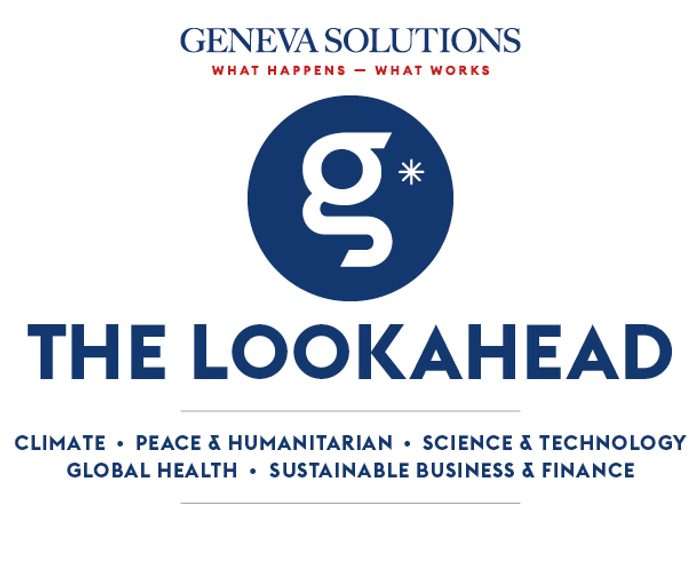Good morning, this is Michelle. Observing International Peace Day over the weekend felt particularly surreal this year. The Middle East stands on the brink of a regional war, hostilities continue to escalate in Sudan’s El Fasher, and Ukraine’s president is on a diplomatic tour, seeking Western weapons that could push the war with Russia into uncharted territory.
Meanwhile, in New York, heads of states and high-ranking officials have gathered for the usual talkfest at the UN General Assembly, where global fractures cast a shadow over the UN's future pact adopted yesterday.
In this restless mood, it is easy to fall into a spiral of pessimism. Yet, there are some voices of reason worth lending an ear to who can offer a glimmer of hope in the darkest times. |

|

Itonde Kakoma, President of Interpeace, in Geneva on 28 September 2023. (Magali Dougados for Le Temps)
|
|
‘We must be bolder to achieve peace’.
As the world marks International Day of Peace on 21 September, some voices don’t get heard often enough. One such voice belongs to Itonde Kakoma, president of Interpeace, an organisation based in Geneva that has spent the last 30 years designing inclusive processes, offering a pathway to lasting peace.
Geneva Solutions
|
|
|
🪖SPOTLIGHT ON UKRAINE-RUSSIA WAR.
The Human Rights Council is set to focus today and tomorrow on the human rights crisis that has been unfolding over nearly 19 months of conflict between Ukraine and Russia.
The Commission of Inquiry on Ukraine will update the UN body on its investigation into violations committed since Russia's invasion. Previous reports by the experts have uncovered evidence of Russian war crimes in seized Ukrainian territories. They will present their latest findings against the backdrop of Ukraine's recent incursion into the Kursk region and its efforts to strike deeper within Russia.
The special rapporteur on Russia, Mariana Kazarova, whose term is ending and states are seeking to renew at this session, will present her latest report, where she describes Russia's "state-sponsored system of human rights violations legalised by new or revised legislation utilised to suppress civil society".
|
|
🗽NEW YORK CALLING.
Yesterday, at 9 a.m. in New York, the gavel came down, marking a milestone in the UN’s history as countries agreed on a pact meant to charter the way for a new and improved United Nations – that is, if states do as they promised and implement the 58 actions in the agreed document.
|
|
🇨🇭FURTHER AFIELD.
Switzerland has agreed to convene an international conference on the Israeli occupation of the Palestinian territories within six months, heeding a proposal approved by the UN General Assembly last week by a two-thirds majority.
As the depository of the Geneva conventions, the Alpine nation is responsible for convening its parties. The meeting will be held in the Palais des Nations in Geneva, just like in its previous editions in 1999, 2001 and 2014.
|
|

(Keystone/Martial Trezzini)
|
|
Three-year-old boy Shinichi Tetsutani was on his tricycle when the United States dropped an atomic bomb on Hiroshima on 6 August 1945. He died hours later from his burns and was buried by his parents with his tricycle in the garden. Forty years later, the remains were exhumed and the tricycle was donated to the Hiroshima Peace Museum.
A bronze replica of the artefact, created by the Japanese artist Akira Fujimoto and the American Cannon Hersey and commissioned by the International Campaign to Abolish Nuclear Weapons, is on display at the museum as a reminder of the fight to abolish nukes.
|
|

(Geneva Graduate Institute)
|
|
On 17 September, Mohamed Mahmoud Ould Mohamedou, deputy director of the Geneva Graduate Institute and Mauritania’s former minister of foreign affairs, passed away. A brilliant intellectual, he pushed back the frontiers of research on key issues such as terrorism, political violence, new forms of conflict, state-building, democratic transitions and the history of racism, write the university’s director, Marie-Laure Salle, and programme director, Davide Rodogno.
Le Temps (FR)
|
|
|
GS news is a new media project covering the world of international cooperation and development. Don’t hesitate to forward our newsletter!
Have a good day!
|

|
|
Avenue du Bouchet 2
1209 Genève
Suisse
|
|
|
|










